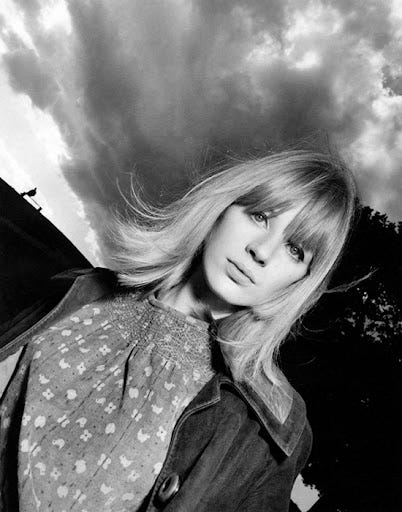Marianne Faithfull died this week at 78. Hal Willner died in 2020 of Covid 19 at 64. I was lucky to know and work with Hal, as open and warm as anyone I’ve ever met. I wrote often about Faithfull’s music and books over the years, though I never got nearer than a phone call. This piece, from Artforum in May 2009, was as close as I came to touching what made both of them unique. They left a mark, on their times and on many hearts.
More than twenty years ago, in 1987—eight years after her shocking punk album Broken English, already twenty-three years after her worldwide smash hit “As Tears Go By” offered the angelic face and voice of a seventeen-year-old who soon enough didn’t just happen to become Mick Jagger’s girlfriend—Marianne Faithfull made Strange Weather. It was an album of cover songs, a collaboration with the producer Hal Willner—and it was leaden, labored, even the lightest arrangements buried under layers of self-consciousness. The idea, it seemed, was to use experience—that is, Faithfull’s notorious life as a longtime heroin addict (“a junkie on the street,” as she put it in her 1994 autobiography) as a concept. Faithfull would throw herself at Bob Dylan’s “I’ll Keep It with Mine,” already indelibly plumbed to its depths by both Dylan and Sandy Denny of Fairport Convention, at “Boulevard of Broken Dreams” from the José Ferrer–Zsa Zsa Gabor version of Moulin Rouge, Lead Belly’s “I Ain’t Goin’ Down to the Well No More,” Billie Holiday’s “Yesterdays,” Tom Waits and Kathleen Brennan’s title song, even back at “As Tears Go By”—and the songs would be transformed, because she had lived. But the only thing more pretentious than the music was Terry Southern’s liner notes: “The fabulous Marianne Faithfull takes up where Lotte Lenya and Marlene Dietrich leave off. In fact, she might well be called the ‘Rhythm and Blue Angel.’”
The first sign that Easy Come Easy Go (Decca), the new Faithfull-Willner collaboration, is different is plain on its face. The album’s front shows a drastically young-looking Faithfull, standing behind a drastically ancient-looking studio microphone, apparently expressing boundless devotion toward whatever it is she’s singing. The tones are muted brown, just past sepia. “12 Songs for Music Lovers,” reads a line below the title (“18 Songs . . .” on the two-disc British version)—just like a generic ’50s album of recent hits by any of the sort of sub–Tony Bennetts and Patti Pages who filled the record stores in those days. And the same sense of humor—of play—is at the heart of Faithfull’s first song, long before the set explodes all over the place with her outrageous duet with Antony (of Antony and the Johnsons) on the Miracles’ “Ooh Baby Baby.”




